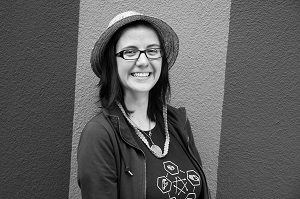Karen Krause (née Krause)

|
|
Professional experience
Karen Kastner (formerly Krause) has been a research associate in the Department of Environmental Psychology at Otto von Guericke University Magdeburg since March 2015. She conducts research on various topics of human-environment and human-technology interaction, such as sustainable lifestyles, energy efficiency, and sustainable mobility.
As part of her doctoral dissertation, Karen Kastner investigated the psychological understanding of solidarity and its relationships to different areas of pro-environmental behaviour and solidary quality of life from 2016 to 2021. In December 2021, she completed her doctorate with the dissertation „Solidarische Lebensqualität - Zum psychologischen Verständnis von Solidarität und ihrer Rolle für Transformationsengagement und Lebensqualität (Solidary Quality of Life - On the psychological understanding of solidarity and its role for transformational engagement and quality of life)" successfully.
In addition, Karen Kastner was or is involved in several externally funded research projects. In the project GLAMURS - Green Lifestyles, Alternative Models and Upscaling Regional Sustainability, funded by the 7th EU Research Framework Program, she helped to develop a theory-based and empirically grounded understanding of the opportunities and obstacles of a societal transformation towards sustainable lifestyles and green economies in Europe. Later, in the joint project ECHO - Energy Efficiency and CO2 Saving at Universities, funded by the national climate change initiative of the BMU, she looked at user-focused intervention techniques for energy conservation in organizations. Since 2018, she has been researching sustainable innovative mobility services, initially in the BMBF-funded project TRANSFORMERS, and from 2020-2022, with a focus on acceptability and human-technology interaction, also in the EFRE-funded project AuRa, she also helped to aquire funds. In the AuRa project, Karen Kastner takes a deeper look at the acceptance and acceptability of such autonomous micromobiles by other road users such as passers-by and car drivers, as well as the human-centered design of this technological innovation.
She completed her master's degree (with a focus on environmental psychology/human-technology interaction) at the OVGU and successfully completed it with her master's thesis "Potentially Saving the World - Perceived and Actual Energy Saving Potentials of German Households" in 2015. In it, she conducted a study on perceived and real electricity saving potentials. During her master's studies, she additionally worked as an assistant researcher at the Fraunhofer IFF and collaborated on studies in the field of virtual realities and their perception and acceptance.
During her bachelor studies at the University of Leipzig, she worked as a student assistant in the Department of General Psychology and completed her bachelor thesis on the topic of empathy research in childhood and adolescence.
Publications
de Paula Sieverding, T., Merten, M., & Kastner, K. (2023). Old for young: Cross-national examination of intergenerational political solidarity. Group Processes & Intergroup Relations, 13684302231201785. https://doi.org/10.1177/13684302231201785
Kastner, K., & Matthies, E. (2023). On the importance of solidarity for transforming social systems towards sustainability. Journal of Environmental Psychology, 102067. https://doi.org/10.1016/j.jenvp.2023.102067
Schmidt, M., Kastner, I., Schmidt, K., Kastner, K. & Schmidt, S. (2023). Developing with People in Mind - A Multidisciplinary Challenge for an Autonomous Cargo Bike (Konferenzbeitrag). 4th International Scientific Convention UCLV 2023, Central University "Marta Abreu" of Las Villas.
Parske & Kastner (2023). Crowdacting as a spark for climate protectiopn? A Digitally Supported Concept for Collective Action. In: Jankowski, P., Höfner, A., Hoffmann, M. L., Rohde, F., Rehak, R. & Graf, J. (Eds.) Shaping Digital Transformation for a Sustainable Society. Contributions from Bits & Bäume (138-142). Technische Universität Berlin. https://doi.org/10.14279/depositonce-17526
Kastner, K., Schmidt, K. & Matthies, M. (2022) Ernährungsstile und Nachhaltigkeit - eine psychologische Perspektive. Einführung in das Schwerpunktthema. Umweltpsychologie, 25(2), 3-11.
Neef, N., Kastner, K., Schmidt, M. & Schmidt, S. (2022). On Optimizing Driving Patterns of Autonomous Cargo Bikes as a Function of Distance and Speed-a Psychological Study. IEEE Open Journal of Intelligent Transportation Systems, 3(2022), 592-601. DOI 10.1109/OJITS.2022.3198120
Schmidt, S., Assmann, T., Junge, L., Höfer, M., Kastner, K., Maoeva, D., Matthies, E., Rietstock, M., Rolof, S., Sass, S. Schmidt, S., Seidel, M. & Weißflog, J. (September 2021). Shared Autonomous Cargo Bike Fleets - Approaches for a novel Sustainable Urban Mobility Solution [Conference Paper]. FISITA World Congress, Virtual Congress, Prag.
Kastner, K., Gehlmann, F., Salzer, S., Kastner, I. & Matthies, E. (2021). Determinants of the acceptability of autonomous (cargo) mobility. Transportation Research Interdisciplinary Perspectives, 11, 100448. doi.org/10.1016/j.trip.2021.100448
Krause, K., Assmann, T., Schmidt, S. & Matthies, E. (2020). Autonomous driving cargo bikes – Introducing an acceptability-focused approach towards a new mobility offer. Transportation Research Interdisciplinary Perspectives, 6, 100135.
Vita, G., Ivanova, D., Dumitru, A., García-Mira, R., Carrus, G., Stadler, K., Krause, K., Wood, R. & Hertwich, E. G. (2020). Happier with less? Members of European environmental grassroots initiatives reconcile lower carbon footprints with higher life satisfaction and income increases. Energy Research & Social Science, 60, 101329.
Krause, K., & Kastner, I. (2019). Ziemlich unterschätzt? Energiesparwissen in deutschen Haushalten − eine Bestandsaufnahme. Umweltpsychologie, 23(2), 58-74.
Ivanova, D., Vita, G., Wood, R., Lausselet, C., Dumitru, A., Krause, K., Macsinga, I. & Hertwich, E.G. (2018). Carbon mitigation in domains of high consumer lock-in. Global Environmental Change, 52, 117-130.
Zug, S., Schmidt, S., Assmann, T., Krause, K., Salzer, S., Seidel, M. (2018). BikeSharing der 5. Generation. Szenarien und Herausforderungen für den Einsatz autonom agirender Fahrräder. In: Jorge Max Gomez (Hg.): BUIS-Tage 2018. Oldenburg.
Krause, K., Quist, J. & Blöbaum, A. (2017). Theorie trifft Praxis – Herausforderungen der Partizipation am Beispiel der Backcasting-Methode. Umweltpsychologie, 41(2), 138-159.
Thronicker, I., Polzin, C., Schulte, M., Krause, K., Blöbaum, A., Petri, M., Berneiser, J. (2016). GLAMURS Deliverable 5.6: Case Study Report. The region of Central Germany. GLAMURS: EU FP7 SSH Call: 2013.2.1-1 - Obstacles and prospects for Sustainable lifestyles and Green Economy, Grant agreement no: 613420.
Schulte, M., Krause, K., Müller, F. J. Y., Bücker, J., Blöbaum, A. & Matthies, E. (2016). GLAMURS Deliverable 5.10: Determinants for the adoption and evolution of sustainable lifestyles on micro-level. GLAMURS: EU FP7 SSH Call: 2013.2.1-1 - Obstacles and prospects for Sustainable lifestyles and Green Economy, Grant agreement no: 613420.





